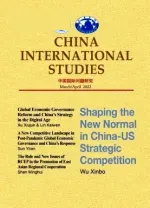The Meandering China-U.S. Relationship
By Chen Yonglong
Director of the Center for American Studies, the China Foundation for International Studies
Given President Obama’s first-term policy toward China, the status of current Sino-U.S. relations, Obama’s campaign rhetoric on China, second-term U.S. presidents’usual concern with their legacy as well as China’s rise and its policy toward the U.S., America’s China policy will most likely be a combination of“engagement, constraint (containment) and cooperation”in the next four years, featuring competition for economic interests and strategic collision between the hegemonic power and the rising power. Looking forward to the next four years,issues such as Taiwan, human rights, the South China Sea and military alliances in Asia will continue to be tools of the United States to balance China; the U.S. will both pressure China and need China’s cooperation on DPRK and Iranian nuclear issues,climate change, etc. In regard to bilateral economic relations,the United States will impose pressure on China on issues such as the RMB exchange rate and trade imbalance, leading to regular frictions between the two sides.
On the whole, Sino-U.S. relations will move forward in a meandering manner, but tensions will not lead to a breakup of the relationship. Here are the basic reasons.
First, the overall interests of the United States dictate that cooperation with China is in the best interest of the U.S. when the U.S. shifts its focus of current and strategic interests to Asia where China is a major player. Given the trend of collision between China and the U.S. in the region, Asia may split if the U.S. attempts to dominate the region (It will go nowhere to rely on the United States politically and on security matters while relying on China economically), and Asia may descent into chaos if China aspires to dominate the region (The United States will make troubles while Japan, the Philippines and Vietnam will also stir up the water.) With its“return to the Asia-Pacific”initiatives, the U.S. intends to contain China but lacks the capability to do so. As for China, there will not be a titfor-tat attitude towards American behavior in Asia and China will not dance to America’s tune either. China does not seek to shut the U.S. out of Asia. China focuses on preventing other countries from undermining China’s initiatives instead of hasty reaction to others’moves.
Second, confrontation between hegemonic powers and rising powers has been serious but not inevitable. China and the United States have begun to explore building a new type of major power relationship. The fourth round of China-U.S. Strategic and Economic Dialogue this year officially set in motion such a quest. Addressing to the Eighteenth Party Congress of the CPC in his capacity as Secretary General, President Hu Jintao outlined a clear strategic vision of building a new type of great power relationship with developed countries. The U.S. side is also seriously contemplating this issue. Sino-U.S. relations have many characteristics which are different than those of the traditional relations between hegemonic powers and rising powers.
Third, the past four decades of Sino-U.S. relations has shown that the two countries can always find a common ground and converging interests despite changing circumstances for cooperation. In cases of major frictions, the two sides could manage the crises. With Obama’s re-election, the China-U.S.Strategic and Economic Dialogue will continue. Covering more and more fields, the mechanism not only creates conditions for cooperation but also serves as an important channel to manage differences between the two countries.
Fourth, deepening economic interdependence between China and the United States, though uncomfortable to some people,remains the basis for the development of Sino-U.S. relations.
Fifth, American policy towards China might continue to feature constraint against China, but there is a limit to the constraint and a possibility remains that it may change. China does not intend to challenge the United States and also lacks the power to do so. The U.S. remains a major factor in the external environment for China’s development.
 China International Studies2012年6期
China International Studies2012年6期
- China International Studies的其它文章
- New Circumstances for China’s Investment in Central and Eastern Europe
- Four Things to Be Done to Promote Future China-U.S.Relations
- Indonesia’s“Confidence”Diplomacy under the Yudhoyono Government
- Singapore’s Economic Diplomacy
- An Analysis on Myanmar Government’s Reforms
- Building a New Type of Relations Between Major Countries
